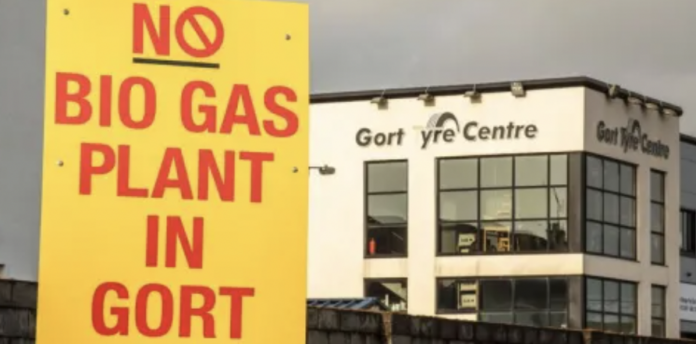AHEAD of a major public meeting to discuss the granting of permission for a biogas plant in Gort, campaigners described the news as an “absolute disaster” for South Galway.
At the end of last month, An Bord Pleanála granted permission for the facility which will be less than one kilometre from the town centre, covering a ten hectare site. While Galway County Council turned down proposals from Sustainable Bio Energy Ltd, the appeals board overturned that decision and has given the green light, subject to 22 conditions.
Gort Biogas Concern Group organised a public meeting on Wednesday (January 4) to examine options, including a judicial review.
“In terms of health issues, traffic issues, environmental issues, we have grave concerns,” group member Ciarán O’Donnell said ahead of the gathering.
“The main thing is that this is a 25 acres massive industrial plant, 900 metres away from Gort town centre, ten metres from Gort river. It’s 100 metres from the nearest resident and 400 metres from the nearest housing estate. To build a plant that size in land that is not zoned industrial, not zoned at all for this is a disaster. It’s an absolute disaster for Gort and South Galway.”
Mr O’Donnell described the grant of permission as “very disappointing and surprising”.
“We have conducted detailed research and highlighted some key fundamental flaws in the biogas planning application in relation to traffic, omissions, public health and water demand, with significant real and potential impacts on our local SACs of Coole Park,” he said.
“Gort has been put forward for the Public Realm Regeneration Scheme, providing a one in a lifetime opportunity to redesign the town centre for modern living. Together with the highly praised Gort Riverwalk and the future potential of the Red Route Cycle way would put Gort firmly on the map as an attractive place to live and work, while attracting tourists and new business to the area. Building a Biogas facility of this magnitude in the town would simply destroy future development potential in South Galway.”
The biogas plant plan, first mooted in 2019, involves the development of a facility that will use of anaerobic digestion technology to produce renewable energy and fertiliser.
The proposed plant would also includes a 23 metre high odour control stack, an 8 metre flare stack, an energy centre with a combined heat and power (CHP) plant and two standby boilers with exhaust stacks of 16.4 metres. Other facilities would include a biogas purification plant, a tank farm, a CO2 processing building and ancillary services.
In December of 2020, following refusal by Galway County Council, Sustainable Bio Energy lodged an appeal. An Bórd Pleanála has spent the last two years examining the plans.
In granting permission, the board upheld the recommendation of its inspector who visited the site and assessed a range of environmental policy documents, the development plan for Galway, waste management and recycling frameworks, spatial guidelines and bioenergy generation policies.
The impact on seven different Special Areas of Conservation (SACs), including the East Burren SAC was also assessed. The board’s decision document stated that it “considered that the proposed development would be in accordance with national, regional and local policy relating to energy and waste” and “would be consistent with national climate ambitions and consistent with the provisions of the Climate Action Plan 2021 and Climate Action Plan 2023”.
The board noted that the site is not zoned for industrial use, but said that that did not preclude the granting of permission. It concluded that subject to compliance with 22 conditions, “the proposed development would be an appropriate use at this location adjoining the planned industrial expansion of Gort” and “would not seriously injure the residential or visual amenities of the area and would be acceptable in terms of pedestrian and traffic safety”.
Stringent conditions have been applied including full compliance with the Environmental Impact Assessment Report (EIAR) and Natura Impact Statement. Limits have been applied to the amount of raw material that can be treated annually and a reporting system must be put in place on the operation of the facility.
Controls will be placed on deliveries, in the interests of road safety and limits have been imposed on the amount of biogas and/or biomethane present on site at any one time. Construction will be monitored and controlled and an odour management and monitoring plan will be required. A development contribution must be paid to the County Council, though details of the amount have not been specified.


